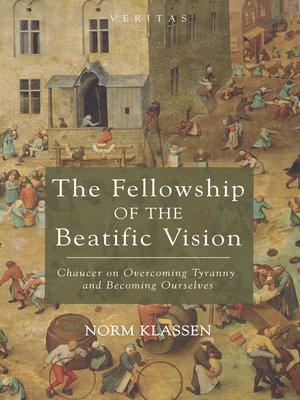The Fellowship of the Beatific Vision
ebook ∣ Chaucer on Overcoming Tyranny and Becoming Ourselves · Veritas
By Norm Klassen

Sign up to save your library
With an OverDrive account, you can save your favorite libraries for at-a-glance information about availability. Find out more about OverDrive accounts.
Find this title in Libby, the library reading app by OverDrive.



Search for a digital library with this title
Title found at these libraries:
| Library Name | Distance |
|---|---|
| Loading... |
In The Canterbury Tales, Geoffrey Chaucer asks a basic human question: How do we overcome tyranny? His answer goes to the heart of a revolutionary way of thinking about the very end of human existence and the nature of created being. His answer, declared performatively over the course of a symbolic pilgrimage, urges the view that humanity has an intrinsic need of grace in order to be itself. In portraying this outlook, Chaucer contributes to what has been called the "palaeo-Christian" understanding of creaturely freedom. Paradoxically, genuine freedom grows out of the dependency of all things upon God.
In imaginatively inhabiting this view of reality, Chaucer aligns himself with that other great poet-theologian of the Middle Ages, Dante. Both are true Christian humanists. They recognize in art a fragile opportunity: not to reduce reality to a set of dogmatic propositions but to participate in an ever-deepening mystery. Chaucer effectively calls all would-be members of the pilgrim fellowship that is the church to behave as artists, interpretively responding to God in the finitude of their existence together.







